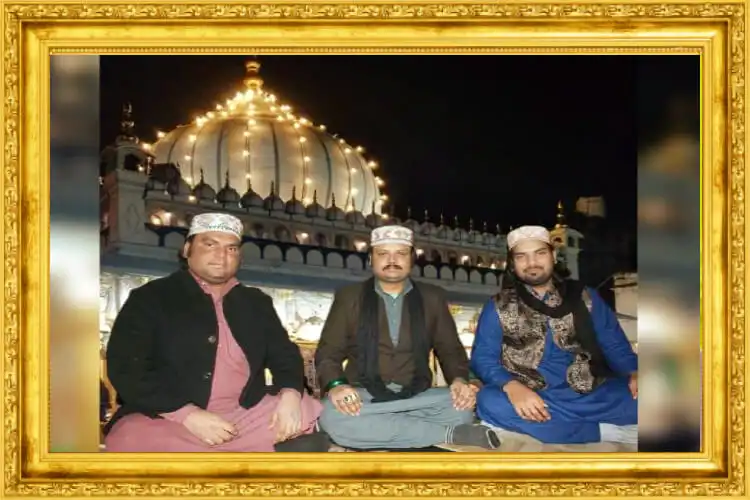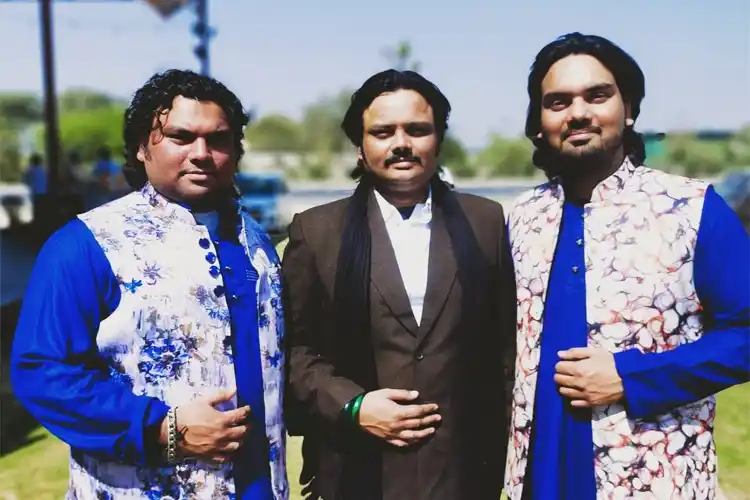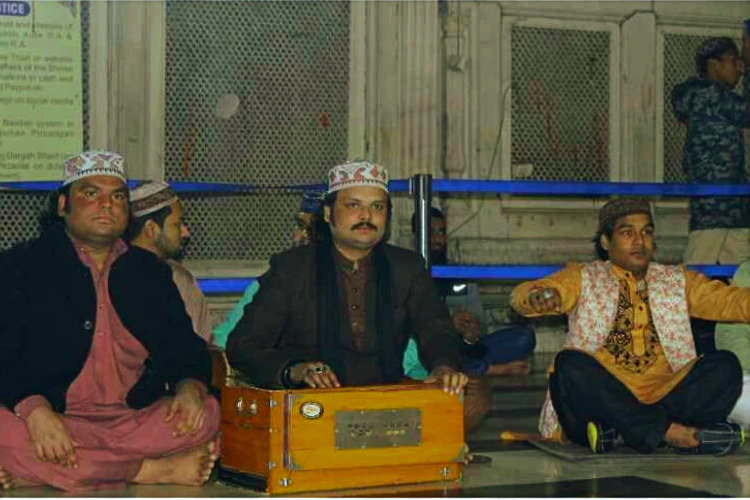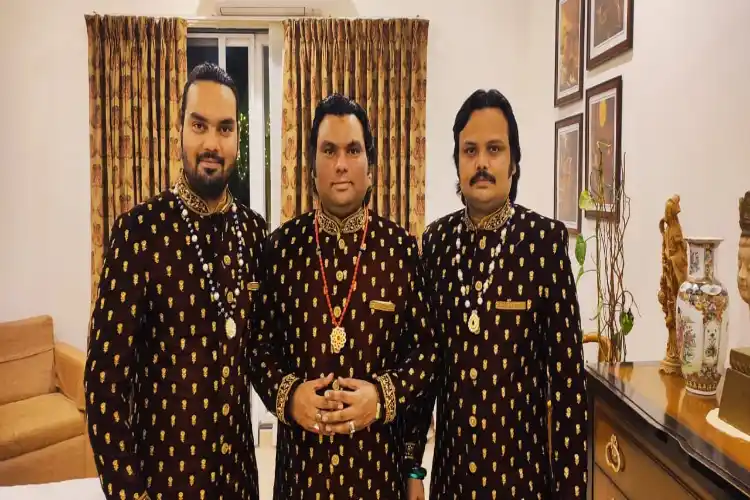
Sabir Hussain
In Delhi’s Nizamuddin Dargah, qawwali has long been an integral part of the shrine dedicated to one of the world’s most famous Sufi saints, Nizamuddin Auliya. Every evening amid the smoke from incense sticks left behind by devotees, eclectic qawwalis rock the dargah and transports the setting into a different world. These singers or qawwals are from the extended Nizami family who now live in Old Delhi and Nizamuddin.
There are several groups of qawwals. The most famous of them is the Niazi Nizami brothers – Haider Nizami (38), Hasan Nizami (37) and Imran Nizami (27). Qawwali has been the driver of their lives for generations stretching about 750 years.
Khandaan
The three brothers who live in Delhi’s Daryaganj area learned the trade from their father Ustad Qadar Niazi who is now in his 70s. Their grandfather Ustad Inam Ahmed Mehboob Ragi was also known as Qawwali Samrat.
“We are the resident qawwals of Dargah Hazrat Nizamuddin Auliya and we belong to the Hapur gharana that traces its connection to Hazrat Amir Khusro,” Hasan Nizami told Awaz-The Voice.

Haider Nizami, Hasan Nizami and Imran Niazi
For these men who enthrall visitors and devotees at the dargah every evening with their soulful songs, qawwali is the only way of life they know and generations have stuck with this tradition. None of the brothers are willing to go on record on whether they have had formal education.
“We have been in this profession for generations. And this is the only thing we know and the only thing we do. And Allah has been kind that we have been able to sustain ourselves fairly well,” says Hasan.
For them, time doesn’t seem to matter and one could be forgiven for thinking that these men may be caught in a time warp. They seem as immersed in qawwali as their ancestors were and it is taken for granted that boys in the family will become qawwals sooner rather than later.
“It is like asking if there is a need to teach a fish how to swim. Boys start training with an ustad by the time they are 7 or 8. I started training with my father when I was around eight years old. When Haider and I were a little older, we started accompanying our father to the dargah to perform with his troupe,” Hasan says.
Lyrics of qawwalis have been handed down generations while the brothers also write their songs. Despite their vast repertoire, the Niazi Nizami brothers are modest to concede that they are no masters of the trade. “You simply cannot master it completely or learn qawwali completely because it is simply too vast. There is always something new to learn,” says Haider.
The conversation with the brothers is frequently punctuated with praises for the Almighty and the prophet and Nizamuddin Auliya.
The qawwalis at the dargah which begin at a designated square in front of Nizamuddin Aulyia’s tomb around 5 pm stop briefly for the two prayers till 7.45 pm in the winter. The performance then goes on till 10 pm.

Niazi Nizami Brothers performing at Nizamuddin Dargah, New Delhi
Lesser-known qawwals are usually the first to perform before the Niazi Nizami brothers usually take the slot after 7.45 pm when the isha namaz ends. By that time, there are a lot of visitors, many of whom come only to listen to these men who usually have only a harmonium and a dhol for musical instruments. A troupe may have about ten men with two lead singers at the front with the harmonium. The percussionists and the accompanying singers sit behind them. The songs come straight from the heart, usually in praise of God, the prophet, and the dargah’s resident saint. They quickly get into the groove that turns the atmosphere into an eclectic one.
Some people show up regularly to listen to the brothers as they belt out one soulful qawwali after another.
Irfan Abbas, a small businessman for Nizamuddin says, “I don’t know what it is, but their songs have a therapeutic effect on me as if they give me solace from the grind and rat race of daily life.”
As song after song enchants the visitors, many of them pay the qawwals. At the end of the show, they divide the money among themselves. On the face of it, that looks like precarious existence and probably it is.
“The pandemic that led to two lockdowns dealt a bad blow to the qawwalls before we managed to recover,” Hasan says.
“By God’s grace, the income is okay although it is not what it used to be. It will take some more time before the situation returns to what it was before the pandemic. Such a pandemic should never happen and we always pray to Allah for everyone’s safety,” says Haider.
It is not only the dargah where the brothers earn. They also sing at private shows in different cities.
“We just returned from Patna a few days ago after performing at a marriage. And there’s a show coming up in Amritsar soon,” says Haider.

The Niazi Nizami brothers ahead of performance
He also acknowledges that their fame gives them an advantage over other qawwals. “Jiska naam hai uska kaam hai,” (“Those who are well-known get work”), says the eldest of the three brothers.
Is it only Muslim families or organizations that call them for private performances?
“No. Many of our patrons are Hindus and Sikhs. The show at Patna was at a Hindu wedding. In Amritsar, it is the Sikhs who are calling us. We have never faced any discrimination. I have very close Hindu friends. We have performed in various cities such as Bhopal, Lucknow, Pune, etc,” says Haider.
For private performances, the three brothers remain the lead singers while about seven others, mostly from their extended family, make up the rest of the troupe.
Over the years the brothers have also performed in foreign countries with the Indian Council for Cultural Relations (ICCR) facilitating their visits to Persian Gulf countries, Europe, Russia, and some African countries.
“Imran is the most sophisticated among us. So, when there is a need to speak in English in places such as foreign airports, we push him forward,” Hasan jokes about his kid brother.
The trio has been noticed by Bollywood also and will soon be seen in an upcoming movie. But the glamour of their profession also extracts a price on their health.
“The shows are usually held at night and they always end well past midnight. Then we go home and sometimes work on our lyrics for the next day. By the time we go to sleep, it is almost dawn and sometimes we have to have wake up even before we complete our sleep. Our eating habits have gone haywire. Our breakfast is usually around lunchtime and subsequently, every other meal gets delayed,” says Haider.
But for the life of them, they will not change the profession they were born into because it would be as bad as blasphemy. Perhaps, just as well because their songs are food for the soul for many people at the dargah and elsewhere.
